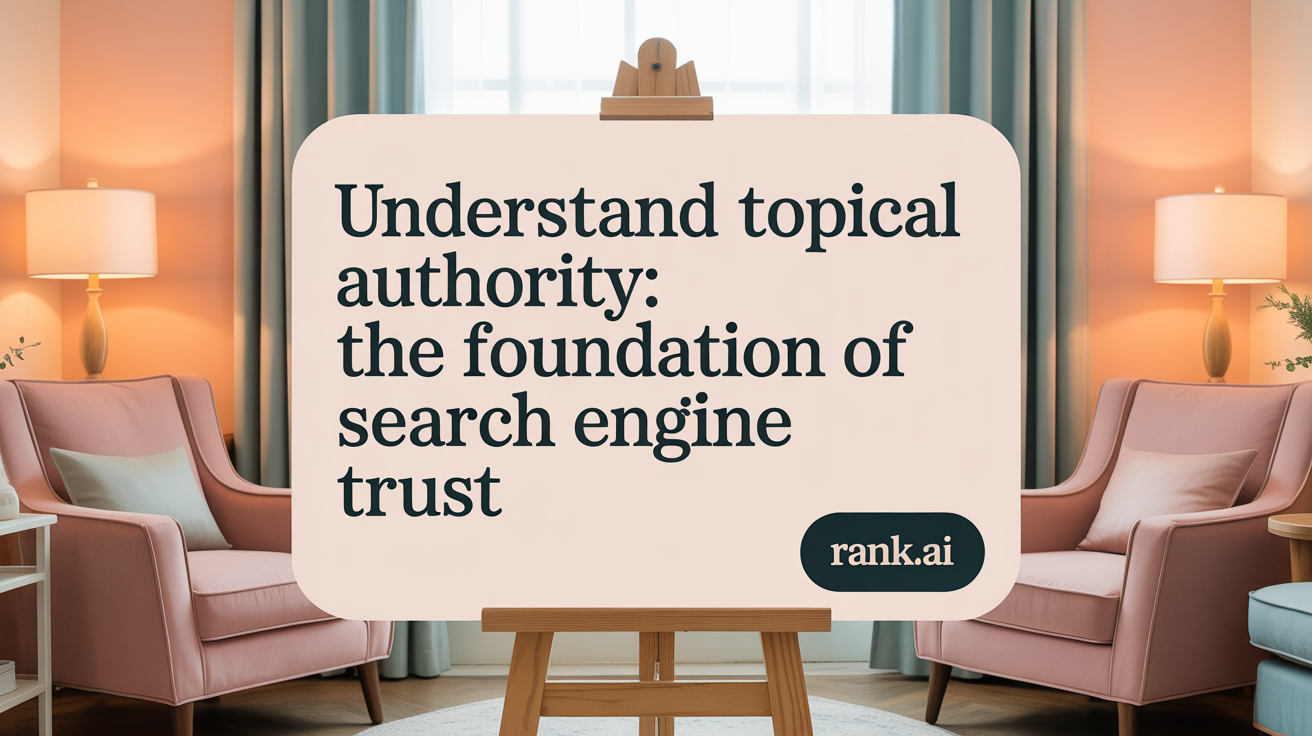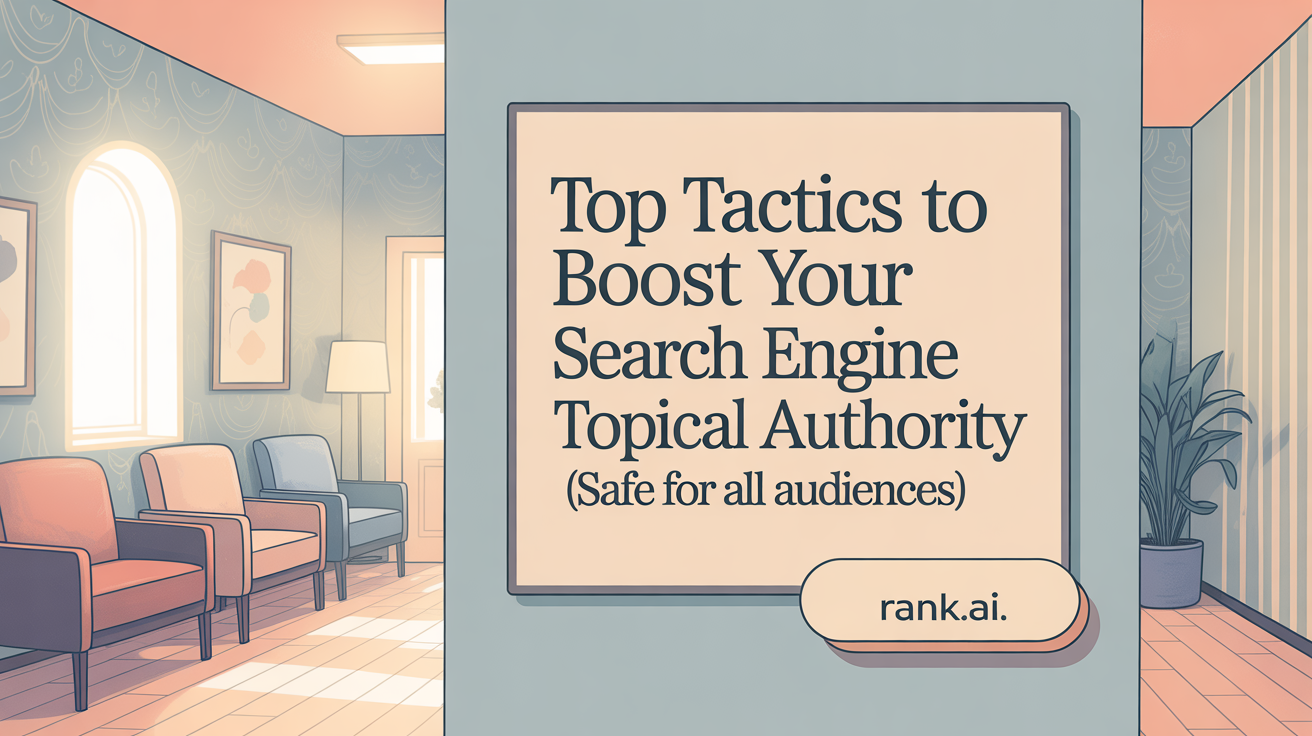Understanding the Power of Topical Authority in Modern SEO and Content Marketing
In today's digital landscape, establishing topical authority has become a pivotal factor for websites aiming to rank highly and gain trust within their industry or niche. As search engines like Google evolve, they place increasing importance on not just keywords but the comprehensive expertise conveyed through a site's content. This article explores how strategic blogging can be leveraged to build and sustain topical authority, thus elevating online presence, credibility, and influence.
Defining Topical Authority and Its Significance in SEO and Content Marketing

What is topical authority in SEO and content marketing?
Topical authority refers to a website’s reputation as a trusted expert on a specific subject or niche. Instead of focusing solely on individual keywords, building topical authority involves creating comprehensive and well-organized content that thoroughly covers a particular topic. Search engines like Google evaluate the depth, relevance, and organization of this content to determine how authoritative your site is in that area.
Google’s algorithms have grown smarter over recent years, placing more importance on understanding how related ideas connect within a subject. As a result, websites that demonstrate deep expertise through high-quality, interconnected content are more likely to rank higher for related searches.
Building this authority isn’t limited to keyword stuffing; it relies on strategic content creation, effective internal linking, and earning reputable backlinks. By focusing on core topics aligned with your audience’s interests and your website’s goals, you not only improve your search visibility but also establish a trusted presence in your niche.
Effective Blogging Strategies for Building Topical Authority

What strategies and methods are effective for building topical authority through blogging?
Building authority in your niche via blogging involves a mix of strategic content creation, outreach, and ongoing performance analysis. One of the primary approaches is to produce consistently high-quality, comprehensive content that thoroughly covers your core themes. This not only demonstrates your expertise but also helps your site become a go-to resource for related topics.
Creating detailed articles and supporting content, such as guides, case studies, and FAQs, ensures you cover all aspects of your niche. This complete coverage, often structured through content clusters and pillar pages, signals to search engines your deep knowledge in a specific area. Implementing SEO best practices, including strategic keyword placement, internal linking, and semantic relevance, boosts your search rankings and organic traffic.
Engagement plays a vital role. Encouraging comments, responding to reader questions, and facilitating social sharing help build a community around your content and expand your influence. Collaborations with industry influencers and experts lend credibility and introduce your site to new audiences.
Further amplifying your content on social media platforms or through targeted digital campaigns can significantly increase visibility. Platforms like Facebook, Twitter, LinkedIn, and Pinterest allow targeted outreach, helping attract the right audience to your blog.
Finally, closely monitoring performance metrics such as website traffic, backlink quality, user engagement, and keyword rankings guides your optimization efforts. Tools like Google Analytics, Ahrefs, and SEMrush provide valuable insights, enabling you to refine your strategies over time.
Implementing these methods consistently can build your site’s topical authority, making it more trustworthy and prominent in search results, which ultimately results in higher organic traffic and sustained growth.
Content Organization and Keyword Clustering: Pillars of Topical Authority
Building topical authority relies heavily on effective content organization and strategic keyword clustering. Implementing the pillar-cluster content model creates a clear and logical hierarchy that demonstrates comprehensive coverage of a broad subject.
A core element is the pillar page, which functions as an authoritative overview or hub for the main topic. This page offers an in-depth introduction and links to multiple supporting articles, known as cluster content, that explore specific subtopics or answer detailed questions.
This interconnected internal linking structure is essential for guiding both users and search engines through related content, showcasing your expertise in the niche. It also improves user experience by providing easy navigation and encourages visitors to spend more time on your site.
Keyword clustering involves grouping related search terms, phrases, and questions into thematic clusters aligned with your content topics. When you develop content based on these clusters, you ensure all relevant search queries are addressed thoroughly. This approach not only enhances relevance but also signals to search engines that your website covers a topic comprehensively, strengthening your authority.
By planning content around well-defined clusters and utilizing the pillar-cluster model, websites can boost their visibility, increase trustworthiness, and establish themselves as authoritative sources in their niche. Maintaining a structured content strategy with organized topic coverage is crucial for ongoing growth in search rankings and user engagement.
Leveraging SEO Best Practices to Boost Topical Authority and Visibility
How do SEO best practices contribute to improving topical authority and online visibility?
Implementing strong SEO strategies plays a crucial role in establishing and enhancing a website’s topical authority. This process starts with creating comprehensive content structures, such as pillar pages that cover core topics and supporting articles that delve into specific subtopics. These content hubs help search engines grasp the full extent of your expertise within a niche.
Internal linking between pillar pages and their related subpages creates a web of interconnected content that signals organized knowledge to search engines. This topic clustering not only improves SEO but also enhances user navigation and experience.
Building relevant backlinks from authoritative sites within your industry further reinforces your credibility and trustworthiness. Backlinks are a form of external validation that indicate your content is valuable and authoritative.
Continuous keyword research and content optimization ensure your pages stay aligned with what your audience is searching for. Using tools like Ahrefs and SEMrush helps identify relevant long-tail keywords and trending topics, keeping your content fresh and targeted.
Aligning with Google’s E-E-A-T principles—Experience, Expertise, Authority, and Trustworthiness—by showcasing credentials, providing valuable insights, and maintaining transparency, boosts your credibility in search rankings.
Adding a technical SEO layer, such as fast loading times, mobile optimization, and semantic search enhancements, provides signals that support authority recognition.
When all these practices are combined, they create a robust framework that elevates your website’s authority within your niche. This leads to higher rankings, increased organic traffic, and a stronger presence in search engine results, making your site a recognized resource for your target audience.
| Practice Area | Main Focus | How It Enhances Topical Authority |
|---|---|---|
| Content Structure | Pillar pages & support articles | Demonstrates comprehensive coverage |
| Internal Linking | Connecting related content | Signals organized expertise |
| Backlink Building | Earning authoritative links | Validates credibility |
| Keyword Optimization | Search intent & relevance | Matches user queries effectively |
| Google E-A-T Alignment | Experience & trust | Builds credibility and ranking |
| Technical SEO | Site speed & mobile | Provides a user-friendly environment |
Staying proactive with ongoing content updates, exploring new related topics, and leveraging AI-driven content insights further solidify your authority.
By adopting these best practices, your site can stand out as a trusted, comprehensive resource—an essential factor in achieving high search rankings and attracting consistent organic traffic.
Creating High-Value, Authoritative Content to Cement Expertise
 Establishing authority in a specific niche heavily depends on the quality and depth of content produced.
Establishing authority in a specific niche heavily depends on the quality and depth of content produced.
Creating high-value, authoritative content is essential for demonstrating expertise and building trust with both search engines and users. This type of content thoroughly covers all relevant subtopics related to the main theme, offering comprehensive insights that address various questions and concerns within the niche.
Providing unique perspectives and insights sets your content apart from competitors. By analyzing industry trends, sharing original data or case studies, and offering actionable advice, you highlight your expertise and deepen your authority in the subject.
Regular updates and expansion of content are crucial for maintaining relevance. Consistently adding new information, refining existing articles, and expanding coverage show search engines and visitors that your site remains a current and reliable resource.
Building content clusters around pillar pages is a proven strategy. These central pages serve as comprehensive resources on core topics, linking to detailed supporting articles that delve into specific aspects. This structure improves site organization and signals authority through its interconnected content.
Enhancing trustworthiness and credibility involves showcasing credentials, citing reputable sources, and earning backlinks from authoritative sites. These actions reinforce your reputation as a reliable expert, which positively influences search rankings.
Moreover, earning high-quality backlinks through the creation of valuable, link-worthy content amplifies your authority. When other credible sites reference your work, it validates your expertise and helps you rank higher in search results.
In essence, developing high-value, authoritative content is a cornerstone of building long-term topical authority. It involves a strategic mix of comprehensive coverage, originality, regular updates, structured content organization, and credibility signals. Together, these efforts position your website as a trusted and influential resource within your niche.
Measuring and Evaluating the Success of Topical Authority Efforts
Tracking the progress of your topical authority-building efforts involves multiple metrics and tools. Key performance indicators (KPIs) such as search rankings for target keywords, organic traffic, and content engagement inform how well your strategies are paying off.
Tools like Ahrefs, Moz, and Semrush provide valuable insights. For example, Ahrefs' Domain Rating (DR) and Semrush's Authority Score offer data on your site's link profile and authority level. Regularly monitoring these metrics helps determine if your content coverage and backlink profile are strengthening.
Analyzing keyword rankings over time shows whether your content is ranking higher for relevant queries. Coupled with organic traffic data, this reveals how visible and influential your topical content has become.
User engagement metrics like dwell time, bounce rate, and pages per session provide additional context. High dwell times and low bounce rates indicate visitors find your content relevant and authoritative.
There are also specialized tools and checkers specifically designed to measure topical authority. These assess how comprehensively and accurately your content covers your niche, including backlink relevance and thematic breadth.
Finally, a qualitative review of backlinks—focusing on their quality and relevance—is essential. High-quality backlinks from reputable sites within your industry signal recognition of your authority and expertise.
By combining these quantitative and qualitative approaches, you can effectively evaluate your strategies and identify areas for ongoing improvement, ensuring your website continues to establish and maintain strong topical authority.
Understanding Content Signals, Topical Maps, and Content Hierarchy in Authority Building
What are content signals, topical maps, and content hierarchy, and how do they help in establishing authority?
Content signals are indicators that search engines use to assess the quality and relevance of your content. These signals include internal linking strategies, semantic relevance of topics, user engagement metrics like time on page and bounce rates, and backlinks. They tell search engines how well your content covers a subject and how trustworthy it is.
Topical maps serve as visual frameworks guiding the strategic arrangement of related content. They help create a blueprint of interconnected topics and subtopics, ensuring comprehensive coverage of a niche. By mapping out core themes and their supporting details, creators can develop a roadmap that demonstrates deep knowledge.
Content hierarchy involves structuring information in a logical, accessible way, typically through pillar pages and supporting articles. Pillar pages act as comprehensive guides on a central topic, while supporting pages delve into specific subtopics. Internal linking between these pages not only improves navigation but also signals to search engines the importance of each piece within the broader subject.
Together, these elements improve search engine understanding by clarifying the relationships and depth of your content. An organized content hierarchy with a well-designed topical map maximizes semantic relevance and boosts site authority. Additionally, this structure enhances user experience by providing clear pathways through your information, encouraging longer visits and higher engagement.
Implementing strategic internal links, creating detailed topical maps, and maintaining a logical content hierarchy establish your site as an authoritative resource. Search engines recognize the authority through the clear demonstration of expertise, comprehensive coverage, and user satisfaction, ultimately helping your website rank higher and build trust in your niche.
Tactics with the Greatest Impact on Building Search Engine Topical Authority
 Building strong topical authority for your website requires a strategic combination of content quality, organization, and credibility signals. The most effective tactics start with creating comprehensive and high-quality content. This means thoroughly covering core topics, subtopics, and related keywords, which helps establish your site as a deep resource in your niche.
Building strong topical authority for your website requires a strategic combination of content quality, organization, and credibility signals. The most effective tactics start with creating comprehensive and high-quality content. This means thoroughly covering core topics, subtopics, and related keywords, which helps establish your site as a deep resource in your niche.
Implementing hub-and-spoke content clustering is another powerful approach. In this model, a central pillar page serves as the main hub, linking to supporting sub-articles that cover specific questions or details. This structure not only improves user navigation but also signals to search engines that your site has organized expertise on a subject.
Internal linking strategies further reinforce your site's authority. By strategically connecting related pages with relevant anchor texts, you help search engines understand content relationships and distribute ranking power across your site.
Earning reputable backlinks is essential for external validation. Focus on gaining links from high-authority, relevant sites through guest posting, creating shareable infographics, or producing viral content. These backlinks act as votes of confidence, boosting your overall site credibility.
Consistent content updates and optimization keep your site current in the eyes of search engines. Regularly reviewing and expanding existing content shows ongoing relevance and helps preserve or improve rankings.
Finally, technical SEO elements like clean URL structures, schema markup, and an organized taxonomy play a crucial role. They make your content easier for search engines to understand and index, enhancing your site's topical signals.
By focusing on these tactics—comprehensive content, organized clustering, internal links, external backlinks, ongoing optimization, and solid technical SEO—you can significantly strengthen your site's authority in search engine rankings.
The Strategic Blogging Advantage: Establishing Recognized Expertise and Leadership
 Building credibility and trust through blogging is a fundamental step toward establishing yourself or your organization as a leader in your field. Consistent publication of insightful, high-quality content helps demonstrate genuine knowledge, showcasing expertise that resonates with your target audience.
Building credibility and trust through blogging is a fundamental step toward establishing yourself or your organization as a leader in your field. Consistent publication of insightful, high-quality content helps demonstrate genuine knowledge, showcasing expertise that resonates with your target audience.
To effectively establish authority, your blog should focus on providing real value, such as industry insights, research findings, and solutions to common challenges. Sharing original data, case studies, and unique perspectives signals authenticity and deep understanding, which set your content apart.
Engaging your audience through a well-structured blog fosters loyalty. Responding to comments, encouraging discussions, and creating content around frequently asked questions help cultivate a community that sees you as a reliable resource.
A strategic blog also enhances your brand and personal reputation. By consistently illustrating your values, transparency, and thought leadership, you position yourself as a go-to authority. This visibility not only builds trust but also raises your profile among industry peers and potential clients.
Moreover, active blogging increases your influence through improved visibility and the establishment of thought leadership. When your content addresses trending topics and provides valuable insights, it attracts backlinks, shares, and mentions — all of which boost your authority.
In the long run, a well-crafted blog can generate numerous opportunities, from speaking engagements to collaborations, and help you gain recognition as an industry expert. The ongoing process of sharing your knowledge and insights solidifies your role as a trusted leader, opening doors that benefit your career or business growth.
| Benefit | Description | Additional Insights |
|---|---|---|
| Establishes Credibility | Consistent high-quality content demonstrates expertise | Builds trust over time |
| Enhances Visibility | Content makes you discoverable to wider audiences | Drives organic traffic |
| Fosters Loyalty | Engaging with readers nurtures a community | Leads to repeat visitors and shared content |
| Strengthens Reputation | Showcases your values, insights, and authority | Differentiates you from competitors |
| Expands Opportunities | Gaining recognition opens doors for collaborations | Increases speaking and media chance |
| Creates Long-term Value | Content longevity boosts ongoing influence | Establishes a durable industry presence |
Utilizing tools like Google Search, Answer the Public, Ahrefs, and social media platforms can help identify relevant topics and questions. Creating content that ranks for these queries further amplifies your authority.
Developing a content hub, supporting articles, and internal links around core themes support SEO efforts and reinforce your expertise. Continually updating and optimizing your content ensures sustained relevance in your niche.
Achieving genuine authority via strategic blogging requires a focus on quality, consistency, and targeting topics that resonate with your audience. Over time, this approach embeds you as a leading voice and trusted source within your field.
Sustaining Topical Authority Through Strategic Efforts
Building topical authority through strategic blogging is an evolving process that requires dedication to quality, comprehensive content coverage, and thoughtful organization. By integrating SEO best practices, leveraging analytical tools, and engaging meaningfully with your audience, you can establish your website or brand as a trusted leader within your niche. Continual content refinement, adaptation to emerging trends, and a focus on genuine expertise will ensure your topical authority not only grows but also sustains its impact over time, driving consistent organic traffic and influence in your field.
References
- How to Build Topical Authority To Improve Your SEO (2025) - Shopify
- This is How I Build Topical Authority on Blogs and Social Media ...
- Topical Authority: What It Is, Why It Matters, & How to Build It
- How to Build Topical Authority in 2025 (+ Free Tool)
- Building Topical Authority: The Key to Driving Traffic and Trust for ...
- What is Topical Authority & How to Build it?
- Building Topical Authority With Strategic Keyword Research



